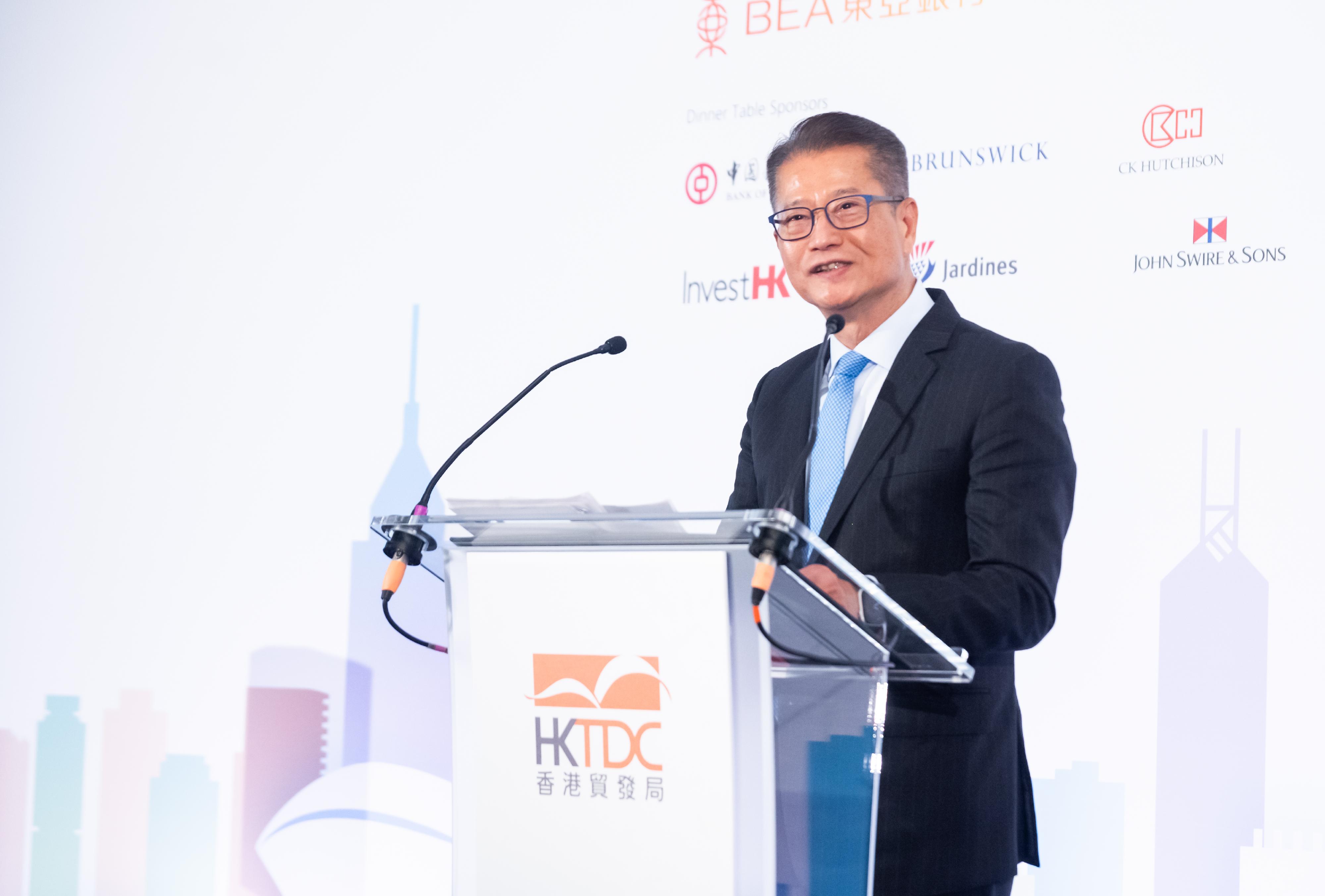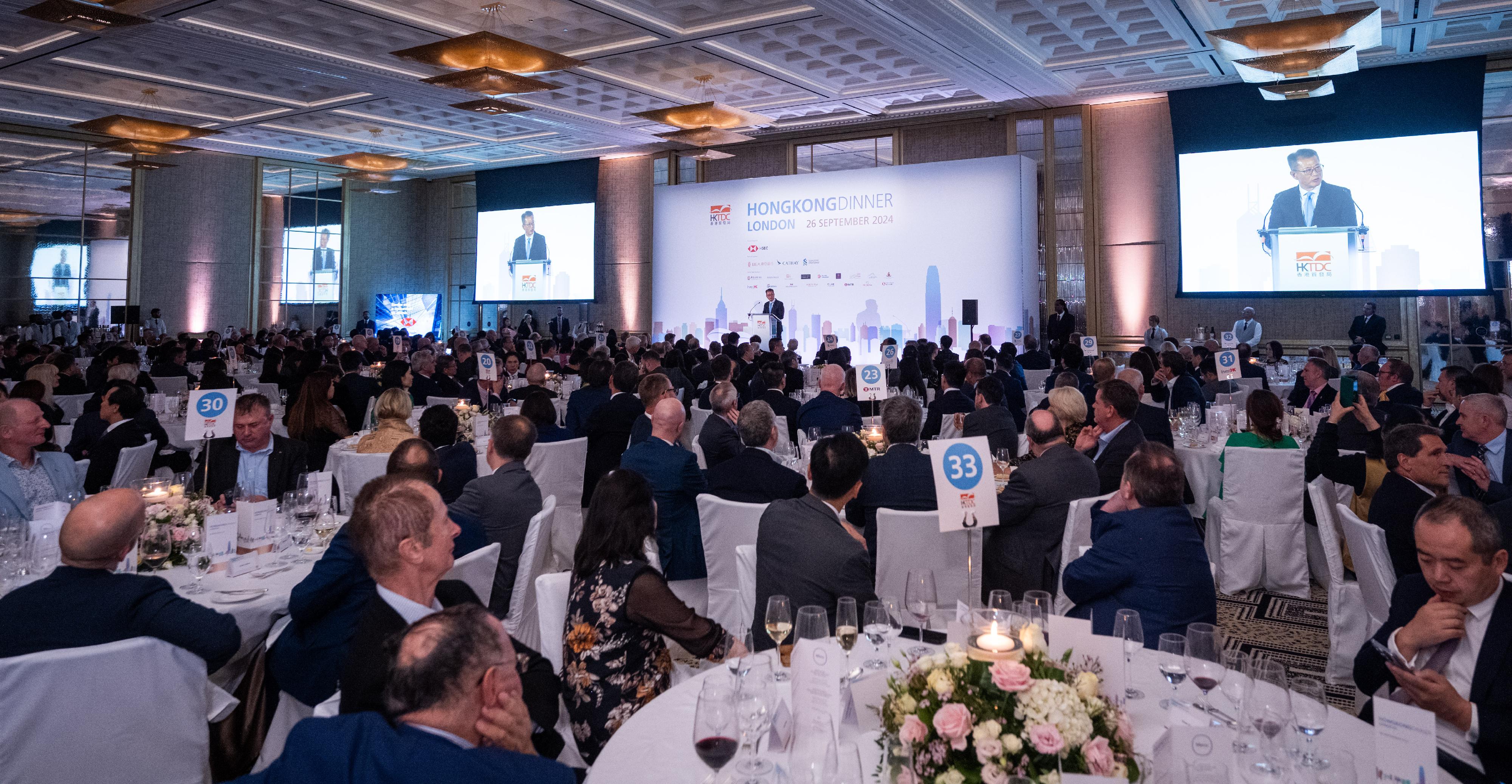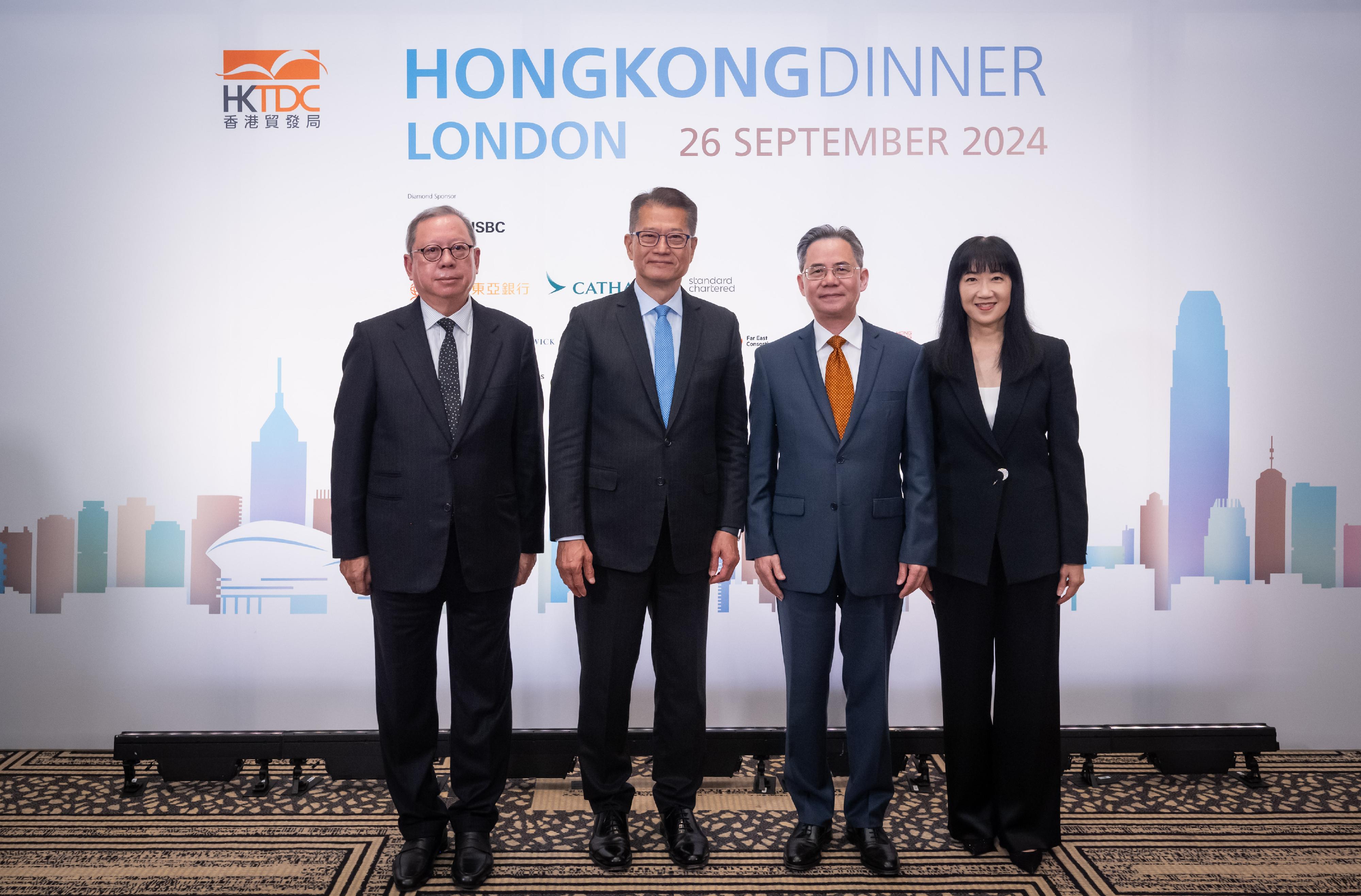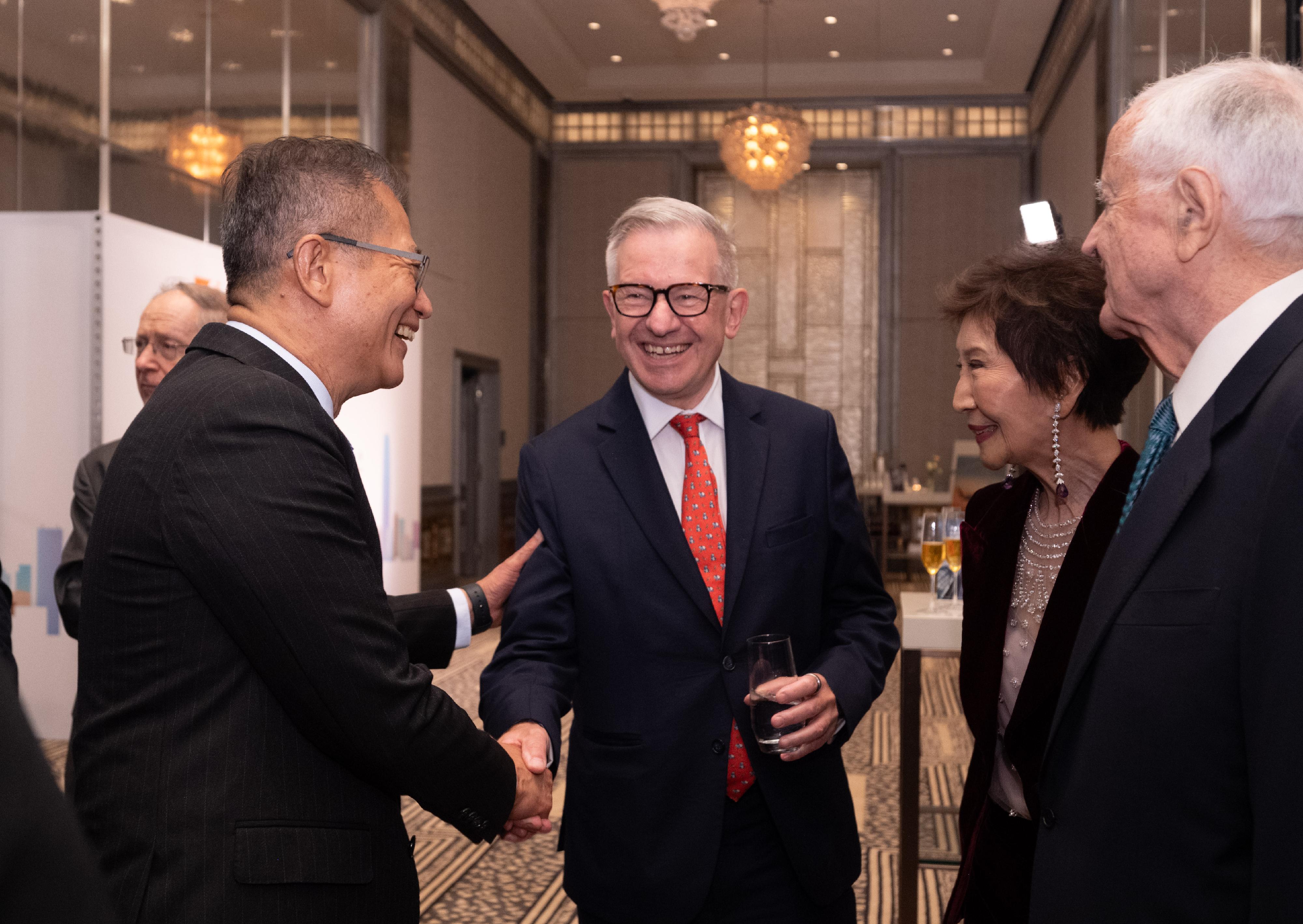Following is the speech by the Financial Secretary, Mr Paul Chan, at Hong Kong Dinner in London, yesterday (September 26, London time):
Peter (Chairman of the Hong Kong Trade Development Council, Dr Peter Lam), Ambassador Zheng (the Chinese Ambassador to the United Kingdom, Mr Zheng Zeguang), ladies and gentlemen, friends of Hong Kong all,
Good evening. I am delighted to be here, once again, for the Hong Kong Dinner in London, the 38th storied edition. We've come together, from London and throughout the UK, from Hong Kong, the Mainland of China and beyond, here to celebrate the long, rewarding and, yes, winding road that our two economies, our two peoples, have travelled over the years.
I was here at last year's dinner. And I am pleased to be back again, bringing news of promising new developments about our city.
Yes, a year on, many things have changed.
Including, a new UK government. Though that is a change some of you, no doubt, have become accustomed to.
What hasn't changed
But there are many things that haven't changed. First, and most important, the enduring economic and people-to-people ties that Hong Kong and Britain enjoy. Just a few examples.
Our bilateral trade came in at about 13 billion pounds last year. That's up 20 per cent over the previous year. In fact, trade between our two economies exceeds that between the UK and Japan.
Hong Kong remains one of the UK's largest foreign investors. In 2022, our stock of direct investment here reached 23 billion pounds.
And Hong Kong's enthusiasm for UK culture was illustrated, yet again, last week, when Coldplay announced they would perform three concerts, next April, at our brand new Kai Tak Stadium.
What also hasn't changed, ladies and gentlemen, are Hong Kong's defining characteristics as an international city.
The "one country, two systems" principle remains at the core of Hong Kong's spirit and success.
At the recent Third Plenary Session of the Chinese Communist Party, in Beijing in July, Hong Kong's role as an international financial, shipping and trade centre was once again trumpeted.
That demands that Hong Kong remain a trusted hub for international investors and businesses. It demands, too, that Hong Kong continue to uphold the key features of "two systems": a common law system, a judiciary that exercises powers independently, a low and simple tax system, the free flow of capital, goods, information and talent, and a currency pegged to the US dollar – alongside all the other advantages that define Hong Kong's singular identity.
Our commitment to the rule of law is as firm as ever. This is exemplified by the ranking, last year, of Hong Kong’s rule of law under the World Justice Project Rule of Law Index. Coming in 23rd out of 142 countries and jurisdictions, we may trail the UK, but we're still ahead of the United States. And we were in the top 10 in the absence of corruption.
And, while two UK judges from our Court of Final Appeal recently resigned, seven esteemed overseas judges have stayed on, including three from the UK.
And including Australia's Justice Patrick Keane. In June, he told the Australian Financial Review that, in his view, the Hong Kong judiciary was competent and independent. He did not see that the Government was pressuring the judiciary or refusing to accept court decisions.
Another aspect of "one country, two systems" relates to land. We recently enacted legislation allowing a simplified extension of commercial, residential and industrial leases well beyond 2047. Hong Kong's leases are written in common law language, and the legislation makes clear that our legal heritage is built to last.
So, too, is our pro-business, pro-investment environment, in which over 9 000 companies from outside Hong Kong call home. We continue to levy no capital gains tax, no goods and services tax, no value-added tax, no withholding tax on dividends and interest, and no digital services tax.
In short, ladies and gentlemen, doing business in Hong Kong is not a taxing situation.
And we continue to enjoy good law and order. Hong Kong remains one of the safest cities in the world.
A column in yesterday's South China Morning Post, written by an Ecuadorian lawyer and political scientist, expands on this, and I quote: "Hong Kong's reputation as one of the safest cities globally provides an example of how safety underpins not just individual well-being but broader social and economic development. Living in a safe environment allows human potential to flourish. Hong Kong," she said, "stands out in this regard."
Yes, like many jurisdictions, we have national security laws. Article 23 of the Basic Law was legislated earlier this year, finally fulfilling our constitutional obligation. It is local legislation, enacted under the common law framework. And, in drafting the legislation, we drew reference to a number of common law jurisdictions.
An American Chamber of Commerce in Hong Kong survey, earlier this year, noted that nearly 80 per cent of its members had confidence in Hong Kong's rule of law. And close to 70 per cent indicated that their operations had not been affected by the National Security Law. A survey, this summer, of Japanese firms by the Japanese Consulate-General in Hong Kong showed similar results.
Yes, investors continue to have confidence in us. Total bank deposits in Hong Kong rose 4 per cent, or over 60 billion pounds, to about 1.6 trillion pounds in the first seven months of this year.
And, just two days ago, the Global Financial Centres Index announced that Hong Kong had climbed back to third overall – and gunning for London. Hong Kong remains one of the world's pre-eminent financial centres.
Ladies and gentlemen, the point, clear and compelling, is this: Hong Kong is not, and never will be, "just another Chinese city."
What is changing is changing for the better
What is changing is changing for the better. The sound and robust fundamentals of Hong Kong are here to stay. And, I'm pleased to say, they're encouraging new developments, fresh opportunities.
Let me begin with the economy. Hong Kong, over the past year and a half, has achieved solid economic growth – up 3.3 per cent last year and 3 per cent in the first half of 2024.
Our inflation remains low, at 1 per cent, and unemployment is just 3 per cent.
Overall, we are expecting a 2.5 per cent to 3.5 per cent growth in our economy in 2024.
Social unrest followed by three years of pandemic have disrupted our connections with the rest of the world. That's why we're organising so many mega events this year – from Art Basel and the Rugby Sevens, to FinTech Week and the Global Financial Leaders Summit. In the first eight months of the year, tourist numbers reached nearly 30 million, increasing by 44 per cent over last year. We expect 46 million tourists this year.
Our flight capacity is also recovering, with passenger throughput reaching over 80 per cent of pre-pandemic levels during peak days. We expect full resumption by the end of the year.
As for cargo, our airport has been the busiest in the world for 13 of the last 14 years. Our Airport Authority is enabling faster, more efficient transhipment of goods through nearby cities such as Dongguan and Zhuhai. That reinforces Hong Kong as the key logistical link between the Guangdong-Hong Kong-Macao Greater Bay Area and the rest of the world.
And I'm pleased to report that the new Three-Runway System at the Hong Kong International Airport will begin operating this year. By 2035, it will handle over 120 million passengers and 10 million tonnes of goods annually.
With all these good changes in place, Hong Kong is taking further steps to boost our "super connector" role – in eight discrete directions: internationally, as finance, trade, shipping, aviation and innovation and technology centres; and, regionally, as Asia Pacific's legal and dispute resolution centre and intellectual property trading centre. We are committed, too, to becoming the East-meets-West centre for international cultural exchange.
Allow me now to just highlight two priority areas: financial services and innovation and technology.
On financial services
Let's start with our capital and fund-raising markets. This year, to date, we've raised about 5 billion pounds through IPOs, making Hong Kong the fourth-largest IPO market thus far. On top, more than 100 companies are now in our listing pipeline. Indeed, in April, the China Securities Regulatory Commission, or CSRC, announced that it would encourage leading Mainland enterprises to list in Hong Kong.
Aside from IPOs, many listed companies have done well in follow-on fundraising, raising some 15 billion pounds so far this year from investors all over the world.
Mutual access between the capital markets of the Mainland and Hong Kong is also growing. In April, CSRC announced expansion of the "Connect Schemes" between Hong Kong and the Mainland, including the scope of ETF Connect and a renminbi trading counter for Southbound Stock Connect.
Mainland and global investors continue to see value and opportunity in the Hong Kong market. Southbound Stock Connect's average daily turnover, for example, jumped nearly 15 per cent in the first eight months of the year, reaching RMB 36 billion a day.
Our asset and wealth-management business is flourishing. We now manage 3 trillion pounds in assets. In fact, last year, we experienced a threefold surge in net-fund inflows in the asset and wealth-management sector – an increase of about 38 billion pounds over 2022.
The Greater Bay Area Wealth Management Connect's expansion, effective in February, will allow more Mainland investors to access Hong Kong's wealth-management products. The initiative has already attracted some additional 7 billion pounds in cross-boundary wealth-management services in a few months' time.
Hong Kong is also home to some 2 700 single family offices, as Deloitte reported earlier this year. Over half of them manage assets of more than US$50 million.
We are also working to bring in new sources of capital, opening up markets in Southeast Asia, the Middle East and beyond.
The launch of an ETF investing in the Saudi market on our stock exchange, last November, was a landmark development between our two markets. Next month will see the reciprocal launch, on the Saudi Exchange, of two ETFs investing in stocks listed in Hong Kong.
On Innovation and Technology
Turning to innovation and technology, Hong Kong is focused on four main areas: artificial intelligence and big data, biotech, fintech, and new energy and new materials.
Using biotech as an example, one of our major initiatives is to establish a Greater Bay Area International Clinical Trial Institute in the Lok Ma Chau Loop area. It will begin operation before year's end and will attract multinational biotech and pharmaceutical companies looking to access the Mainland market.
That's only the beginning. We are working to establish a primary evaluation system, allowing medicine and medical devices approved in Hong Kong to be widely used in the Greater Bay Area, the Asian region and beyond.
These two initiatives together will make Hong Kong a magnet for multinational biotech and pharmaceutical companies looking to access the Mainland market.
Hong Kong's start-up system is also booming. Last year, the number of start-ups in Hong Kong grew 7 per cent, to about 4 300. And 20 per cent of their founders are from overseas, with the greatest number from the UK.
Speaking of which, I'm leading a delegation of start-ups from the Hong Kong Science and Technology Parks and Cyberport. They're here this evening, happy to talk to you about opportunities for collaboration, about how their companies are changing people's lives for the better.
Our efforts in attracting strategic enterprises from all over the world to Hong Kong are paying off. To date, more than 100 such companies, including AstraZeneca, have settled in Hong Kong. Together, they will invest some 5 billion pounds in our city, creating more than 15 000 jobs.
Then there's the Northern Metropolis, a 300-square-kilometre area in Hong Kong bordering Shenzhen. The Northern Metropolis is destined to rise as an innovation and technology hub, a vast bridgehead for Hong Kong's co-operation with other Greater Bay Area cities. We welcome the participation of British companies and contractors in its construction and development.
Ladies and gentlemen, for these, and a good many other plans, to work, we need a continuing flow of talent. In addition to attracting strategic companies, we're also encouraging talents to turn to Hong Kong for their future. To date, we've received some 360 000 applications under our various talent admission schemes. About 226 000 applications have been approved, and some 150 000 professionals have already arrived, settling into Hong Kong. Our arms are wide open, and welcoming, to talent from the UK, of course.
Closing remarks
Beyond finance, beyond I&T, we're still very much in the business, and pleasure, of arts and culture and entertainment.
Last November, the Hong Kong Palace Museum – one of our West Kowloon Cultural District flagships – showcased Botticelli to Van Gogh: Masterpieces from the National Gallery, London.
It was, I'm delighted to tell you, a dazzling display of East-West harmony, of Hong Kong-London cooperation at its most creative.
I can drink to that all evening. But first, I'd like to play a short video for you. It puts a spotlight on our vibrant city – as an events capital and as an international centre for cultural exchange, where East and West come together.
That's Hong Kong, ladies and gentlemen: dynamic and welcoming, for business and investment, and for the many pleasures of life. I look forward to seeing you, soon, in Hong Kong.
Enjoy the Hong Kong Dinner and all the great and good company about you.
May I ask you to raise your glasses now. Let's drink to the enduring friendship between Britain and Hong Kong, Hong Kong and Britain.
Cheers!
Follow this news feed: East Asia









